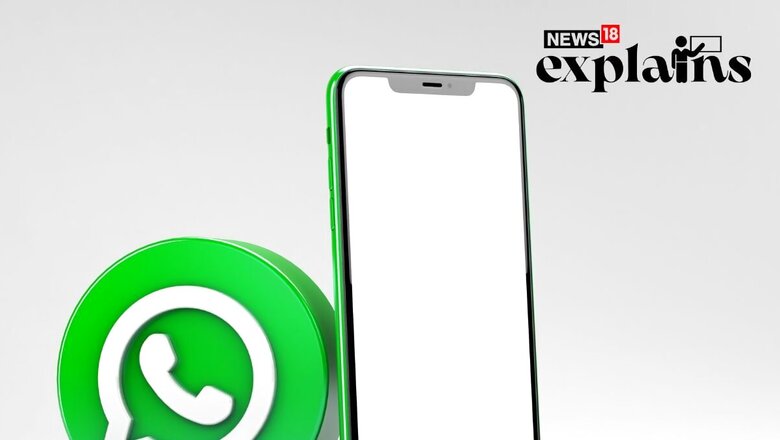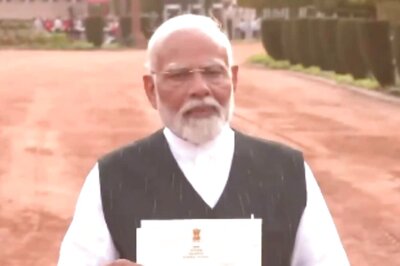
views
The government will investigate a claim that WhatsApp accessed the microphone of smartphone users while the phone was not in use, Minister of State for Electronics and Information Technology Rajeev Chandrasekhar said on Wednesday.
In a tweet, the minister said the government will examine the alleged breach of privacy even as the new Digital Personal Data Protection Bill was being readied.
This followed a claim that WhatsApp accessed a user’s microphone while he was sleeping.
“WhatsApp has been using the microphone in the background, while I was asleep and since I woke up at 6 AM,” Foad Dabiri, an engineering director at Twitter said on Saturday. “What’s going on?” Replying to Dabiri’s tweet, Chandrasekhar said, “This is an unacceptable breach and violation of privacy.” “We will be examining this immediately and will act on any violation of privacy even as the new Digital Personal Data Protection bill is being readied,” he added.
Dabiri’s tweet went viral, attracting over 65 million views.
In another scam, Millions of WhatsApp users in India have been left baffled at the amount of international spam calls they have been receiving in the last couple of days, leaving many at the risk of financial loss.
These spam calls with international numbers, mostly from African and Southeast Asian countries, along with fake messages from unknown users, have flooded WhatsApp and Indians have nowhere to go but Twitter to share their ordeal.
Let’s understand what these scams are and how to protect yourself against them:
What Did WhatsApp Say About the Mic Recording Issue?
On the mic recording issues, WhatsApp responded saying it has been in touch with the Twitter engineer over the last 24 hours, who posted an issue with his Pixel phone and WhatsApp.
“We believe this is a bug on Android that misattributes information in their Privacy Dashboard and have asked Google to investigate and remediate,” WhatsApp said in a tweet.
The company also claimed that users have full control over their mic settings.
“Once granted permission, WhatsApp only accesses the mic when a user is making a call or recording a voice note or video – and even then, these communications are protected by end-to-end encryption so WhatsApp cannot hear them,” it added.
The engineer working with Twitter shared screenshots of his phone which showed WhatsApp accessing and using his handset’s microphone at various times even as he was asleep. The screenshots prompted several users, including Twitter and Tesla Inc chief Elon Musk, to raise concerns.
“WhatsApp cannot be trusted,” Musk tweeted on the screenshot shared by Dabiri. “Or that WhatsApp founders left Meta/Facebook in disgust, started #deletefacebook campaign & made major contributions to building Signal. What they learned about Facebook & changes to WhatsApp obviously disturbed them greatly.”
WhatsApp Under Scrutiny in India
WhatsApp has been under scrutiny in India over various issues. In October last year, the Meta-owned messaging app saw a two-hour service disruption, prompting the Ministry of Electronics and Information Technology (MeitY) to ask the platform to share reasons for the disruption.
Separately, WhatsApp users in India have reported a massive surge in incoming international spam calls over the past few days. Many users complained on Twitter that a major chunk of these spam calls had country codes belonging to Indonesia (+62), Vietnam (+84), Malaysia (+60), Kenya (+254) and Ethiopia (+251).
According to a Statista report, there are over 487 million WhatsApp users in India, making it the biggest market for the company.
Sextortion Scandals
As per a BOOM Live report, some WhatsApp users have also become victim to sextortion bids.
A Aijaz Baba narrated his ordeal to the publication, and how he had received a WhatsApp video call, which he attended. He saw a dark background at the other end, with occasional blinking lights. He disconnected the call but it lasted for 9 seconds.
He later received a video message from that number, which featured his video from the call but with added nude and obscene footage. The scammer then attempted to blackmail him with the doctored footage. The report states that similar incidents have been reported by others.
Is WhatsApp Actually Safe?
WhatsApp’s end-to-end encryption mechanism has been based on Open Whisper Systems’ open-source Signal protocol since 2014.
According to WhatsApp’s documentation, end-to-end encryption secures practically all of your communication on the network. Messages, media, voice notes, phone conversations, and even status updates are all included, as per a report by Android Authority.
However, ordinary public-key encryption is insufficiently secure on its own. It is hampered by a single point of failure. If your private key is ever compromised, an attacker might easily decrypt your past, present, and future discussions. To address this, the designers of Signal’s protocol invented an approach known as double ratchet encryption.
Instead of a fixed set of keys for each user, the protocol use a combination of permanent and temporary keys. The latter changes with each subsequent message you send. This means that even if a hypothetical attacker obtained access to a single key, they would only be able to decrypt a few communications. Constantly regenerating keys appears to be an overdone solution, but it is also simple enough that our cellphones can easily handle it, the report says.
However, WhatsApp isn’t flawless; it collects a lot of information on you outside of the chat interface. Among the information gathered is your contact list, location, device identifiers, and transaction history, according to the report.
How to Protect Yourself
As per a Times of India report, these WhatsApp calls are harmful, and users should not respond to them. If you receive such calls, you are most certainly being targeted by scammers. As a result, it is vital that you do not answer such calls.
According to the publication, many of these calls are part of multinational con artists’ schemes. If you respond to these WhatsApp calls or messages, the person on the other end is likely to offer you a job that seems great and needs no effort. Scammers pose as representatives of a reputable company offering part-time tasks that may be done from home.
WhatsApp users who receive such calls must take care not to respond to them. It is preferable to block all such numbers. If you do respond to such a call, be sure you don’t believe whatever the person on the other end is promising.
PTI contributed to this report
Read all the Latest Explainers here




















Comments
0 comment